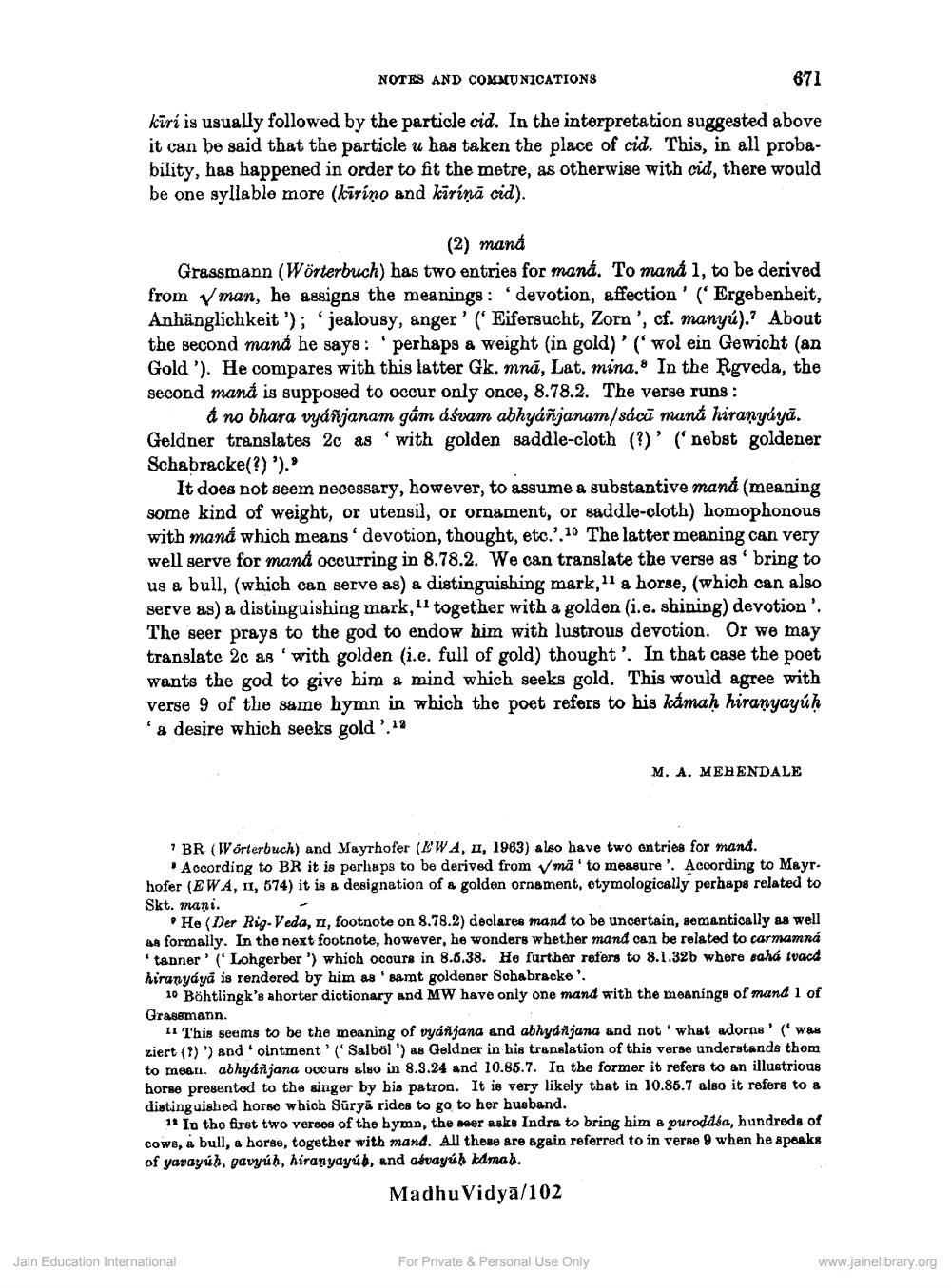________________
NOTES AND COMMUNICATIONS
671
kirí is usually followed by the particle cid. In the interpretation suggested above it can be said that the particle u has taken the place of cid. This, in all probability, has happened in order to fit the metre, as otherwise with cid, there would be one syllable more (Kūrino and kūriņā cid).
(2) mana Grassmann (Wörterbuch) has two entries for mana. To maná 1, to be derived from man, he assigns the meanings: 'devotion, affection' (Ergebenheit, Anhänglichkeit '); jealousy, anger' (Eifersucht, Zorn', cf. manyú).? About the second maná he says: perhaps & weight (in gold) '('wol ein Gewicht (an Gold'). He compares with this latter Gk. mnā, Lat, mina. In the Rgveda, the second mand is supposed to occur only once, 8.78.2. The verse runs :
á no bhara vyáñjanam gám áśvam abhyánjanam/sácā mana hiranyáyā. Geldner translates 2c as 'with golden saddle-cloth (?)' (nebst goldener Schabracke(?)').
It does not seem necessary, however, to assume a substantive mand (meaning some kind of weight, or utensil, or ornament, or saddle-cloth) homophonous with maná which means' devotion, thought, etc.'.10 The latter meaning can very well serve for mand occurring in 8.78.2. We can translate the verse as bring to us a bull, (which can serve as) a distinguishing mark, 11 a horse, (which can also serve as) a distinguishing mark, 11 together with a golden (i.e. shining) devotion '. The seer prays to the god to endow him with lustrous devotion. Or we may translate 2c as 'with golden (i.e. full of gold) thought'. In that case the poet wants the god to give him a mind which seeks gold. This would agree with verse 9 of the same hymn in which the poet refers to his kámaḥ hiranyayúk ' a desire which seeks gold '.12
M. A. MEHENDALE
7 BR (Wörterbuch) and Mayrhofer (EWA, 4, 1983) also have two ontries for mand.
. According to BR it is perhaps to be derived from v ma' to measure'. According to Mayrhofer (EWA, 11, 674) it is a designation of a golden ornament, etymologically perhaps related to Skt. mani.
• He (Der Rig Veda, II, footnote on 8.78.2) declares mand to be uncertain, semantically as well as formally. In the next footnote, however, he wonders whether mand can be related to carmamná 'tanner' ('Lohgerber') which ocoure in 8.8.38. He further refers to 8.1.32b where sahá ivaca hiranyáya is rendered by him as 'samt goldener Sobabracke!
10 Böhtlingk's shorter dictionary and MW have only one mand with the meanings of mand 1 of Grassmann.
11 This seems to be the meaning of vyáñjana and abhyánjana and not what adorne' (WAB ziert ()') and ointment' (Salböl') as Geldner in his translation of this verse understands them to mean. abhyánjana ooours also in 8.3.24 and 10.86.7. In the former it refers to an illustrious horse presented to the singer by his patron. It is very likely that in 10.86.7 also it refers to a distinguished horse which Süryä rides to go to her husband.
11 In the first two verses of the bymn, the seer asks Indra to bring him a puroddba, hundreds of cows, a bull, a horse, together with mand. All these are again referred to in verse 9 when he speaks of yavayúh, pavyúb, hiranyayúd, and asvayub kdmah.
Madhu Vidyā/102
Jain Education International
For Private & Personal Use Only
www.jainelibrary.org




